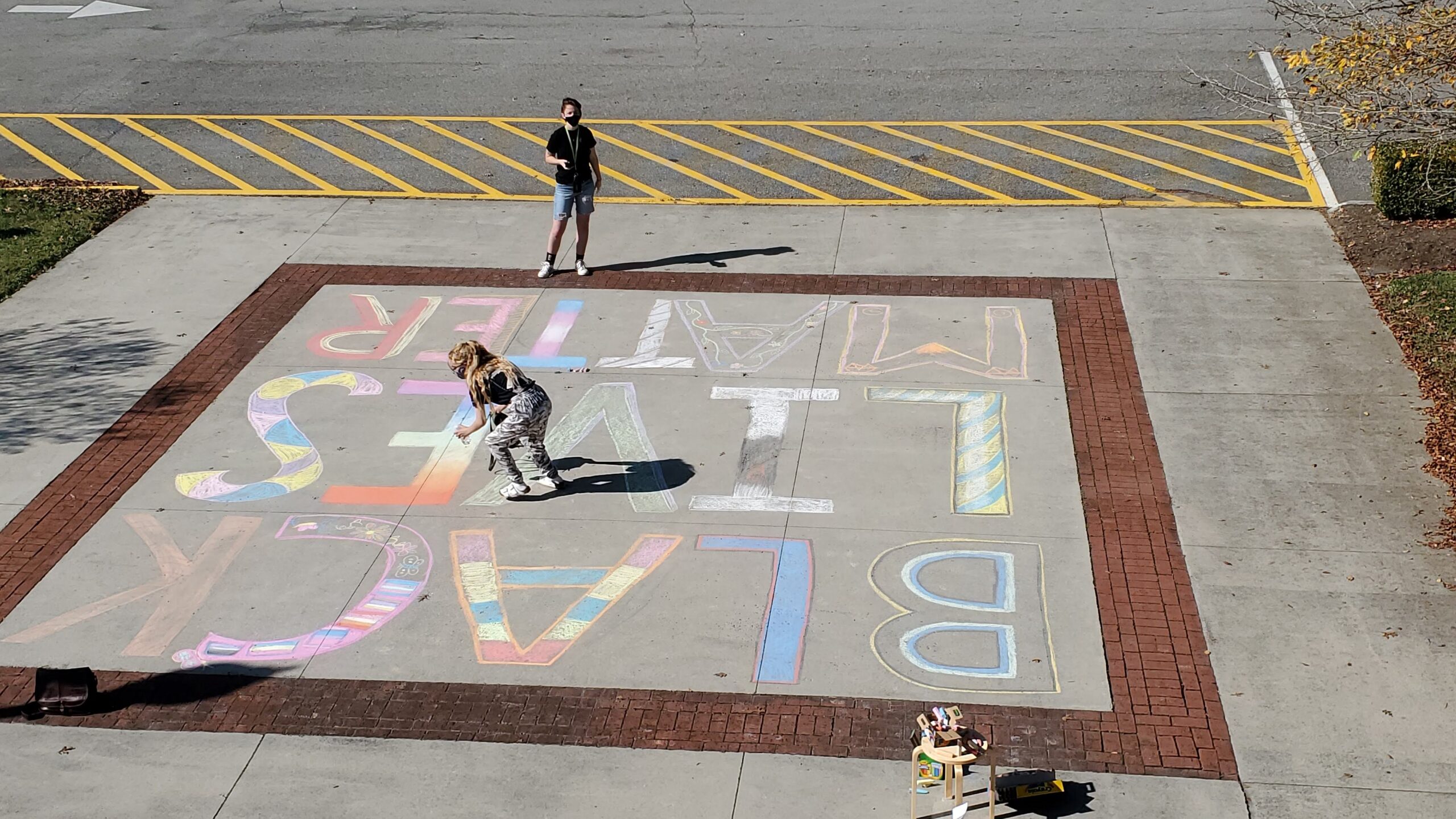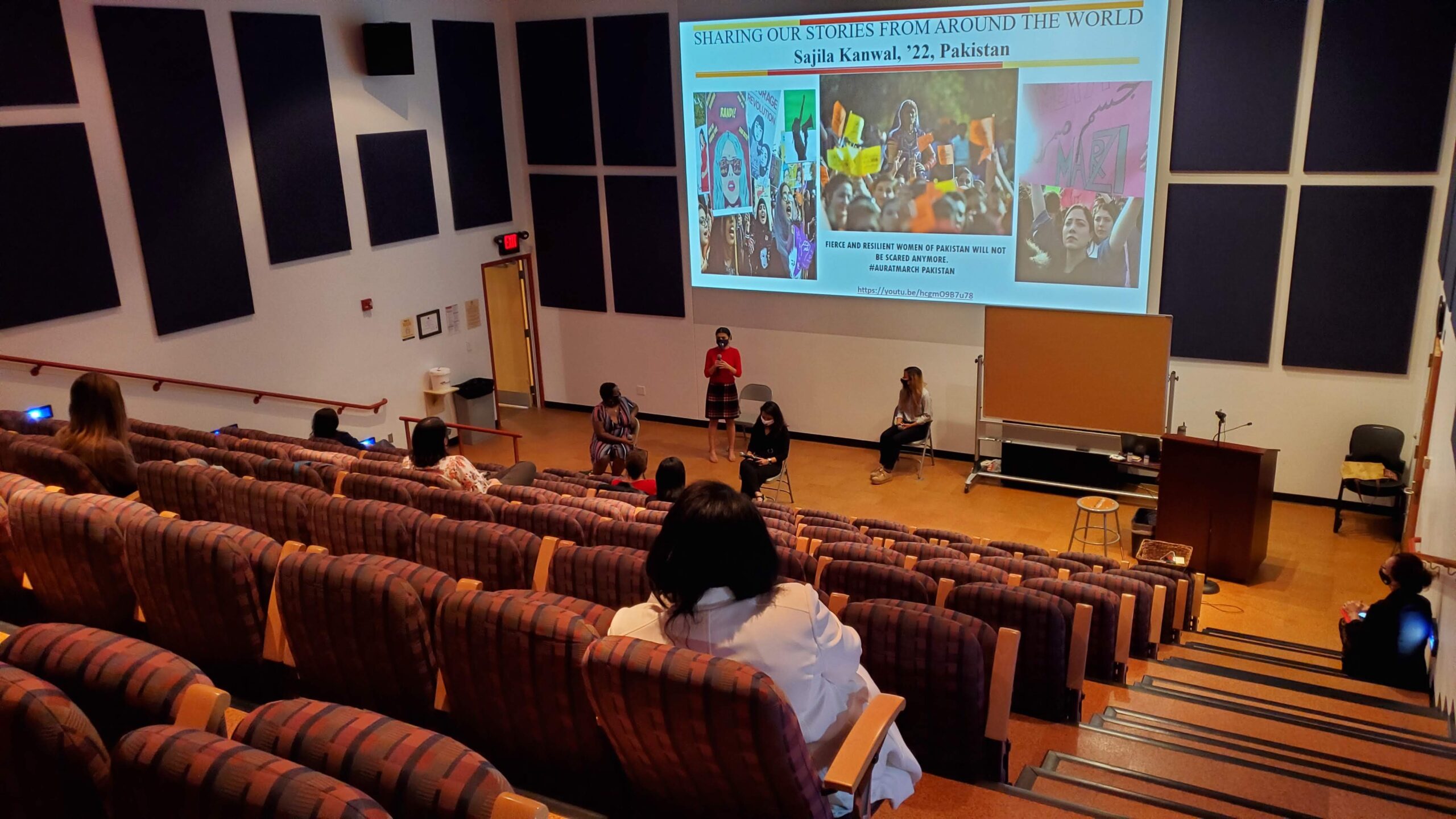More than 550 students, faculty, staff, alumnae/i, and trustees joined together to explore themes of race and racial justice during Hollins University’s first annual Leading Equity, Diversity, and Justice (EDJ) Day on October 23.
Classes were cancelled and administrative offices were closed to foster full engagement in the day’s program, which featured 35 in-person and online sessions presented by members of the university community and invited guest speakers.
“Leading EDJ is the result of an awesome collaboration between folks from across our campus,” Professor of Anthropology and Gender and Women’s Studies and Director of Faculty Development LeeRay Costa said in her opening remarks. “What began as an idea for advancing critical conversations around inclusion, identity, and equity on our campus became today’s event in the span of just 42 days.”
The “social unrest, violence, and an uprising of everyday people from all walks of life in response to the killing of George Floyd and Breonna Taylor by police officers” this summer, as well as everyday injustices experienced by Black and Indigenous people and other people of color, Costa noted, were among the catalysts for Leading EDJ Day.
“The call in the nation for social justice was loud and resolute, but it is not new. It was only the most recent iteration of a fierce and aching plea that has been voiced repeatedly by racial and ethnic minorities in North America for hundreds of years.”

Costa added that Hollins, like other colleges and universities around the country, reacted to the deaths of Floyd and Taylor and the reinvigoration of the Black Lives Matter movement “with a statement of solidarity and shared anguish over the suffering of our fellow human beings, and a promise to do more. And like so many other institutions, Hollins was called out by some for being generous with our words but repeatedly failing to live those words in ways that have meaningful difference to marginalized and underserved members of our community.” She explained that Hollins still needs to come to terms with its own history of racial injustice, including the use of enslaved people to support the institution and its mission.
“To say that Hollins University was built on the backs of Black and Brown people is not hyperbole, nor is it meant to incite,” Costa said. “It is merely to tell the truth.”
In her welcome, Hollins President Mary Dana Hinton echoed Costa, stating that “during this pandemic and moment of racial reconciliation, we must speak truth.” She cited Costa “for her original vision and bold suggestion” to create Leading EDJ Day, and paid tribute to the committee of campus community members that brought the idea to reality. “Perhaps a different group would have deferred. A different group might have said, ‘Let’s wait until it’s easier. Let’s look away. Let’s not do our part; perhaps someone else will do it for us.’ But this group, this committee for whom I am so very grateful, looked at one another and said, ‘Let’s do this.’ And we did. And we did it because it is hard. We did it, in fact, because time is working against us and the need for justice.
“But most of all, we did it because our students and this institution that we love so dearly needed us to. Because we all deserve more. We all deserve better.”

Hinton also praised the more than 40 Hollins students who planned and presented sessions during the day that “come from a place of care, a desire to belong, a need to be seen and appreciated for their experiences, both good and bad. Our students genuinely believe they can make us better, and we them.”
Makda Kalayu ’23 co-led the presentation, “Caring for Your Neighbors: Promoting Beloved Community,” along with Kiah Patterson ’23 and Tyler Sesker ’22. The session featured an exercise to encourage attendees to identify their own implicit biases, followed by a discussion on identifying and breaking down stereotypes of Black people that impact those biases.
“It was a great space to have these difficult conversations,” Kalayu reflected. “A mix between faculty, staff, and alumnae/i diversified the discussion and encouraged people to talk. And [it] also helped to direct the conversation in a really interesting way. Everyone was super respectful. A lot of [participants] came in with an eagerness to learn about the topic.”
“The New Vanguard: Pushing the Envelope in Revolutionary Discourse,” moderated by Leah Coltrane ’22 and Amy Duncan ’21, explored ways of not only transforming one’s own community, but also the way one interacts with their community and themselves on a daily basis.
“We carry a lot of trauma, and making space to take care of those things is important,” Coltrane told attendees. “If you’re not taking care of your spiritual self while trying to learn, trying to do this work, you will not be successful.”
Tia McNair, Ed.D., vice president in the Office of Diversity, Equity, and Student Success and executive director for the Truth, Racial Healing, and Transformation Campus Centers at the Association of American Colleges and Universities in Washington, D.C., delivered conference’s keynote address, “Truth, Healing, and Transformation: From Equity Talk to Equity Walk.”
The renowned author and speaker considered two crucial questions: How do we prepare the next generation of strategic leaders and thinkers to break down racial hierarchies and dismantle the belief in the hierarchy of human value that fuels social injustice? And, how do we examine our own perceptions of equity, diversity, and inclusion to advance practitioner knowledge for racial justice in higher education?
“Our job as educators, as leaders of institutions, is to do the ‘people work’ first,” McNair said. “We have to understand our own mindsets, our own preconceived notions, our own biases, before we can even attempt to transform systems and structures. If we focus on becoming best practitioners that uplift the goals and values of what it means to be diverse and equitable and inclusive, [to be] justice-focused, equity-focused, and anti-racist-focused, then we can do the work to transform our systems and our structures.”
McNair encouraged attendees “to figure out the kind of institution you’re going to be, and stay true to that in all areas as we clarify our actions. To be equity-minded is a mode of thinking exhibited by practitioners who are willing to assess their own racialized assumptions, to acknowledge their lack of knowledge in the history of race and racism, to take responsibility for the success of historically underserved and minoritized student groups, and to not only build their knowledge about race and racism, but also to critically assess racialization in our own practices as educators and administrators.”

Costa emphasized that the first Leading EDJ Day “is just one small step on that journey of transformation, to becoming a more equitable and just university, workplace, and in the words of [feminist theorist, cultural critic, artist, and writer] bell hooks, a ‘home place.’ A place where every single one of us feels like we belong. It’s an opportunity for truth-telling, for listening with our defenses down and our hearts and minds open, and for learning new ways of being together across our differences.”
Stressing Hollins’ “unique responsibility to create an environment wherein each person feels and is loved as they are,” Hinton expressed the university’s obligation as a liberal arts institution “to explore, to know, to honor, and to hold with care the experiences of those around us. To engage multiple perspectives that challenge our own. To open and free our minds to engage with ideas, concepts, people, and experiences that challenge us. That forces us to think critically and creatively. That demand we solve the complex problems of the day in conversation with others.
“The liberal arts demand this work of leading equity, diversity and justice. Indeed, today reflects the meaning and purpose of education and our collective responsibility and mutual accountability to all those we encounter.”
Top photo: Hollins’ Diversity Monologue Troupe, a team of student leaders who perform monologues to help the university community understand the diverse identities and life experiences of people on campus and to broaden the perspective on various stereotypes commonly reinforced in society.











